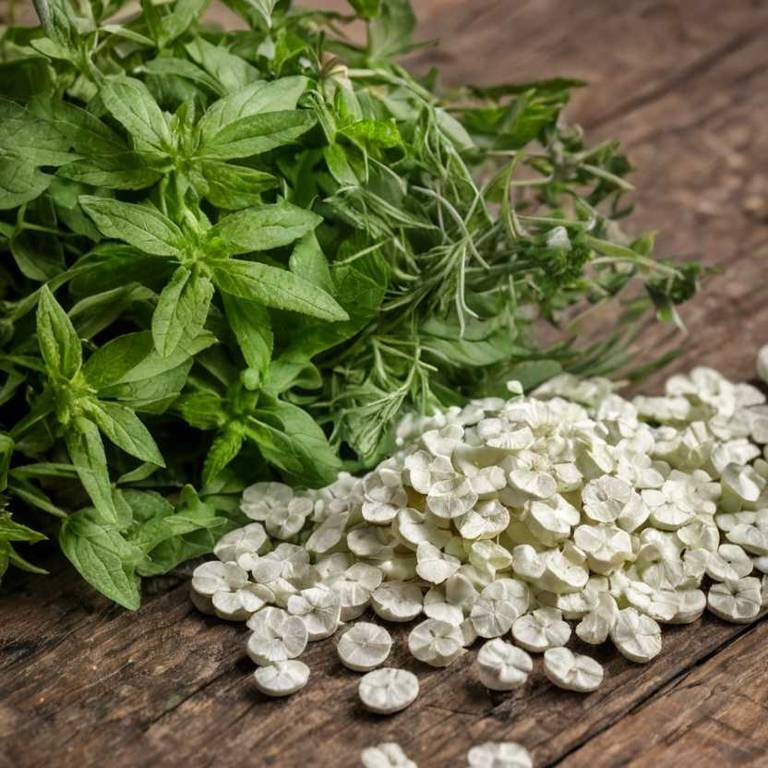By Leen Randell
Updated: Jul 20, 2024
10 Medicinal Constituents Of Lippia Alba (Lemon Verbena)

Lippia alba has active constituents such as limonene, linalool, and β-caryophyllene.
These constituents possess antimicrobial, anti-inflammatory, and antioxidant properties. They help alleviate digestive issues, reduce stress and anxiety, and protect against cancer. For example, linalool can improve sleep quality by reducing insomnia and promoting relaxation.
Additionally, the anti-inflammatory properties of limonene can alleviate symptoms of arthritis, allowing individuals to live a more comfortable and active life.
This article explains in details the 10 best active constituents of Lippia alba.
1. Essential oil
Lippia alba essential oil is a sweet and uplifting aroma extracted from the leaves of the plant.
It has been used for centuries in traditional medicine and aromatherapy to promote relaxation, reduce anxiety and stress, and improve sleep quality.
With its citrusy and herbaceous scent, lemon verbena essential oil can also be used as a natural insect repellent and skin toner, making it a versatile and beneficial addition to any natural wellness routine.
2. Beta-caryophyllene
Lippia alba beta-caryophyllene is a sesquiterpene compound found in its essential oil.
This naturally occurring compound has been shown to exhibit various biological activities, including anti-inflammatory, antioxidant, and antimicrobial properties. Beta-caryophyllene is also reported to have a positive impact on the endocannabinoid system, making it a potential therapeutic agent for various diseases.
Further research is needed to fully understand its mechanisms of action and potential applications in human health.
3. Alpha-pinene
Lippia alba alpha-pinene is a natural compound extracted from its leaves and flowers.
It belongs to the pinene family of terpenes, which are known for their antimicrobial and antioxidant properties. Alpha-pinene has been traditionally used in traditional medicine to treat various ailments, including bronchitis, coughs, and fever.
Its fragrance is also used in perfumery and aromatherapy to promote relaxation and reduce stress.
4. Limonene
Lippia alba limonene is a naturally occurring compound extracted from the leaves of the plant.
It has been used in traditional medicine for centuries due to its antiseptic and anti-inflammatory properties.
Limonene has also shown potential as a natural preservative, insect repellent, and antioxidant, making it a valuable component in various industrial applications such as food and cosmetics.
5. Gamma-terpinene
Lippia alba gamma-terpinene is a naturally occurring monoterpene compound found in its leaves and essential oil.
It has been extensively studied for its potential health benefits, including antimicrobial, anti-inflammatory, and antispasmodic properties. Gamma-terpinene has also shown promising results in the treatment of various diseases, such as Alzheimer's disease, cancer, and anxiety disorders.
Its unique chemical composition makes it a valuable component in traditional medicine and aromatherapy practices.
6. Cineole
Lippia alba cineole is a natural compound found in the essential oil of this plant.
Cineole is a monoterpene that possesses several beneficial properties, including anti-inflammatory and antimicrobial effects.
It has been traditionally used in folk medicine to treat various ailments, such as coughs, colds, and skin irritations, and is also valued for its calming and uplifting aroma.
7. Linalool
Lippia alba linalool is a compound found in its essential oil.
This herbaceous plant is native to South America and has been traditionally used in folk medicine for its various benefits.
Linalool, a sesquiterpene, is responsible for the citrusy and sweet aroma of lemon verbena, which is often used in aromatherapy for its calming and relaxing properties.
8. Sabinene
9. Myrcene
Lippia alba myrcene is a sesquiterpene compound extracted from its leaves.
This essential oil has been used in traditional medicine for its anti-inflammatory, antioxidant, and antiseptic properties. Myrcene is also responsible for the characteristic citrusy flavor and aroma of Lippia alba, making it a popular ingredient in aromatherapy and food products.
Its medicinal benefits include relieving pain, reducing fever, and treating respiratory issues.
10. Beta-phellandrene
Lippia alba beta-phellandrene is a natural compound found in its essential oil.
It is a sesquiterpene hydrocarbon with a citrusy and sweet aroma, commonly used in perfumery, aromatherapy, and traditional medicine. Beta-phellandrene has been reported to possess various bioactive properties, including anti-inflammatory, antiseptic, and antioxidant activities, making it a valuable ingredient in cosmetics and pharmaceutical applications.
Its unique fragrance and potential health benefits make beta-phellandrene an attractive component in natural products development.